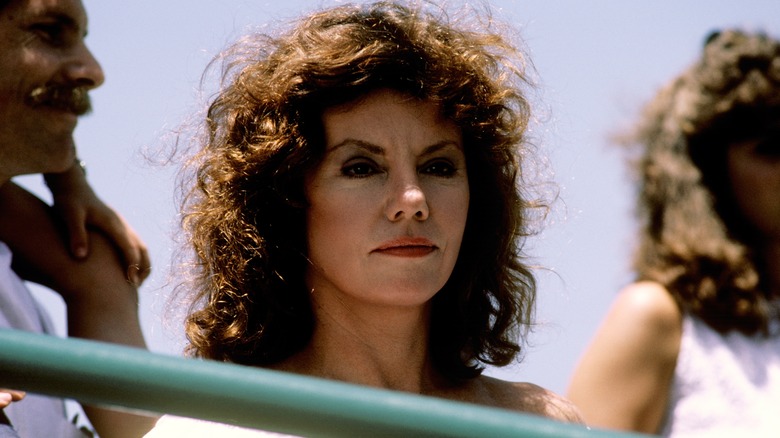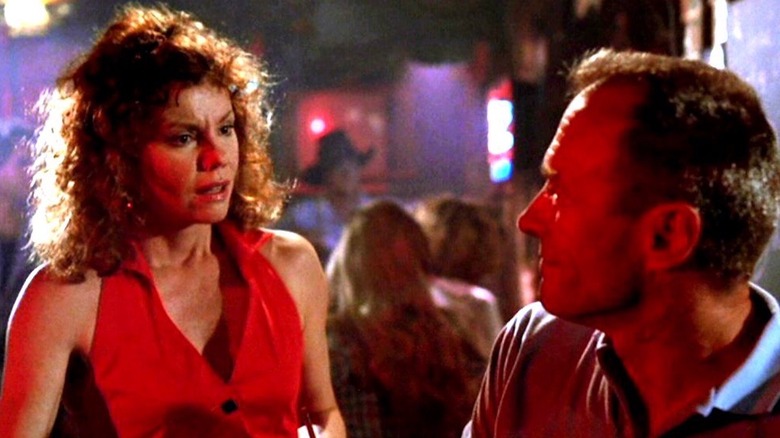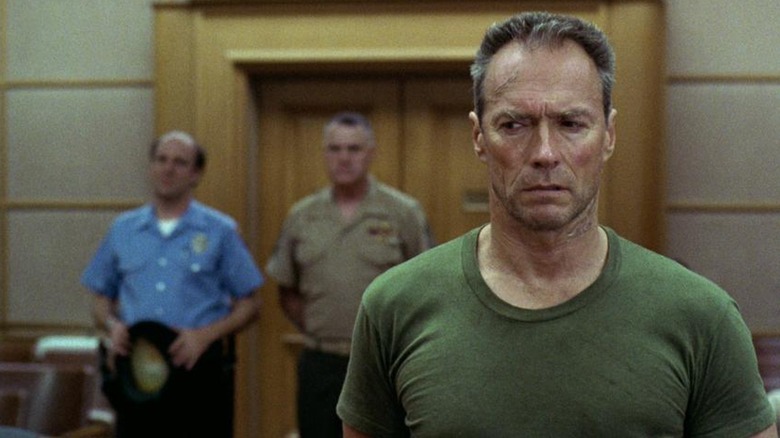Clint Eastwood Believes Strong Female Characters Are The Key To Making A Quality Film
One of the most fascinating aspects of Clint Eastwood's 65-year film career has been his willingness to play not just ornery cusses, but, in many cases, a downright bastard. From The Man with No Name in Sergio Leone's "Dollars Trilogy" to nonagenarian drug smuggler Earl Stone in "The Mule," Eastwood has always sought out messes of manhood: lousy husbands, absent fathers, and straight-up killers. If retired rodeo star Mike Milo winds up being Eastwood's acting swan song, he might stand as one of the kindest characters in Eastwood's oeuvre.
What kind of self-respecting woman would take up these heels? That's what the female characters in Eastwoods' films are often wondering. The answer, of course, is that Clint's laconic nature masks a boyish playfulness that can be irresistible (especially when he's using an orangutan as his wingman). He's a tall drink of water who plays it gruff until he flashes that devilish grin, at which point it's all over.
That's when the trouble starts. These women soon realize they're married to/living with supreme screw-ups who carouse with blackout abandon. To Eastwood's credit, he wants his leading ladies to give better than they get. There are numerous great female performances in Eastwood films (e.g. Jessica Walter in "Play Misty for Me," Tyne Daly in "The Enforcer," Meryl Streep in "The Bridges of Madison County"), but one that gets strangely overlooked, given the caliber of the performer he cast, is Marsha Mason in "Heartbreak Ridge."
Clint looked to old-school Hollywood glamor for toughness
"Heartbreak Ridge" is a rarely generous serving of red meat to Eastwood's fanbase. He stars as Gunnery Sergeant Tom Highway, a Korean War hero who's spent the majority of his post-combat career in a bottle of booze. When Highway gets the opportunity to set up shop at his old stomping grounds in Camp Lejeune, North Carolina, he finds himself at odds with a hostile commanding officer (Everett McGill), who assigns him to the laziest unit on base. Highway, determined to shape up, goes to work on his layabout charges, but his achievement will ring hollow if he doesn't reconcile with his ex-wife, Aggie Highway (Mason).
Mason had been nominated for four Academy Awards prior to getting cast in "Heartbreak Ridge," and this was her first film role since she divorced playwright Neil Simon in 1983. So there's some added stink on her fastball when, in response to Tom's bon mot "You never talked dirty like that when we were married," she fires back, "Yes, I did; you were just never around to hear it."
In an interview with Roger Ebert, Eastwood said he saw old-school, movie-star toughness in Mason. As he said:
"The stronger the participation of the female characters, the better the movie. They knew that in the old days when women stars were equally as important as men. [Katherine] Hepburn, [Bette] Davis, [Claudette] Colbert. They had great faces and great voices. By the 1950s, somehow all the female roles became sort of glorified gals in blue jeans at the next-door barbecue. They'd lost their strength. Now they get a few lines, a little sex scene, and that's the end of it. I'm a lot more interested in women than that."
Cutting a badass down to size
Mason's Aggie is strictly a supporting character in "Heartbreak Ridge," but because she handily deflates Highway, we figure there's more to this decaying soldier than a hard-case crank who loathes what's become of the Marine Corps. Eastwood is always relaxed on screen, but he seems to be having a ball with Mason. It's the best, and deceptively toughest kind of film acting: listening to your co-star and being in the moment. These characters are too old for histrionics and know each other far too well to engage in such emotional fireworks. Highway's honest enough with himself to know he's got this coming, but he also knows Aggie wouldn't respect him if he dropped to his knees and begged forgiveness. She likes him and is turned on by him because he'll bring the banter.
These scenes, and the film in general, represent Eastwood at his most sentimental. "Heartbreak Ridge" is unmistakably redolent of the Hollywood-led hype-up of the United States' war machine a decade removed from the end of the Vietnam War, but Eastwood isn't trying to drive military recruitment à la "Top Gun" or "Rambo: First Blood Part II." He just wants the people who dedicate their life to serving their country to feel seen on a human level, warts and all. And he couldn't have accomplished this without the great Marsha Mason.


